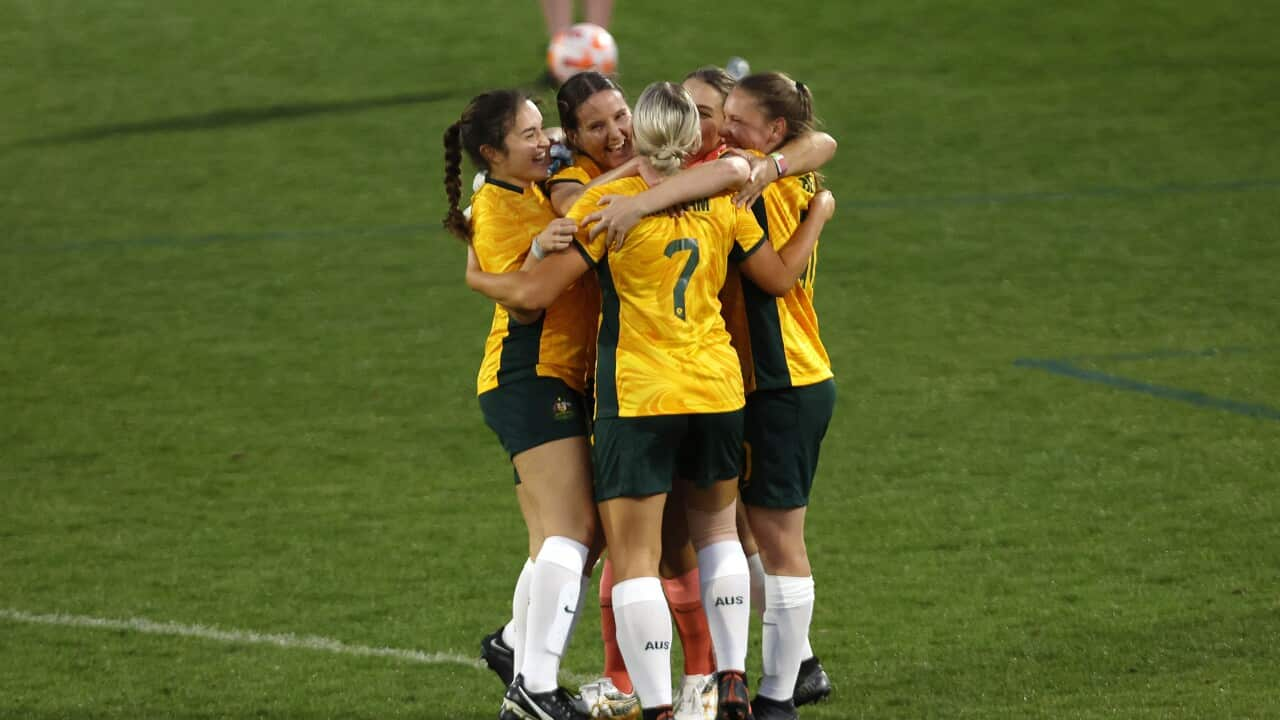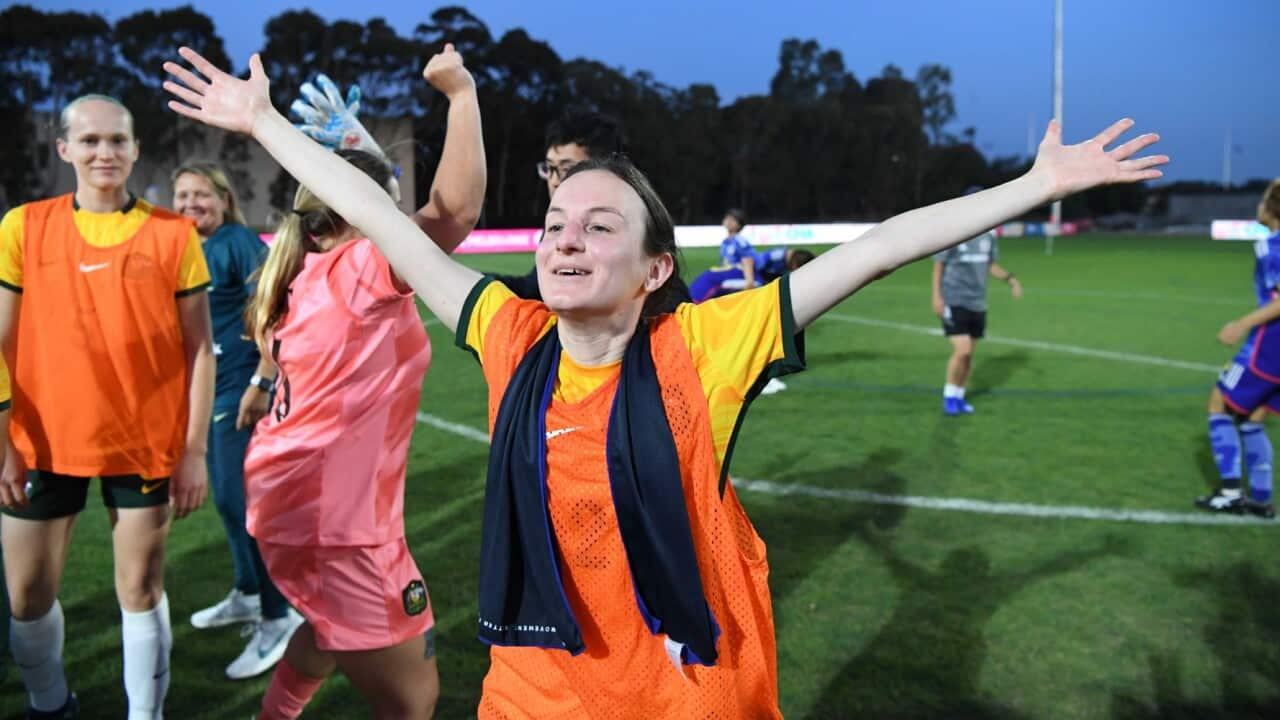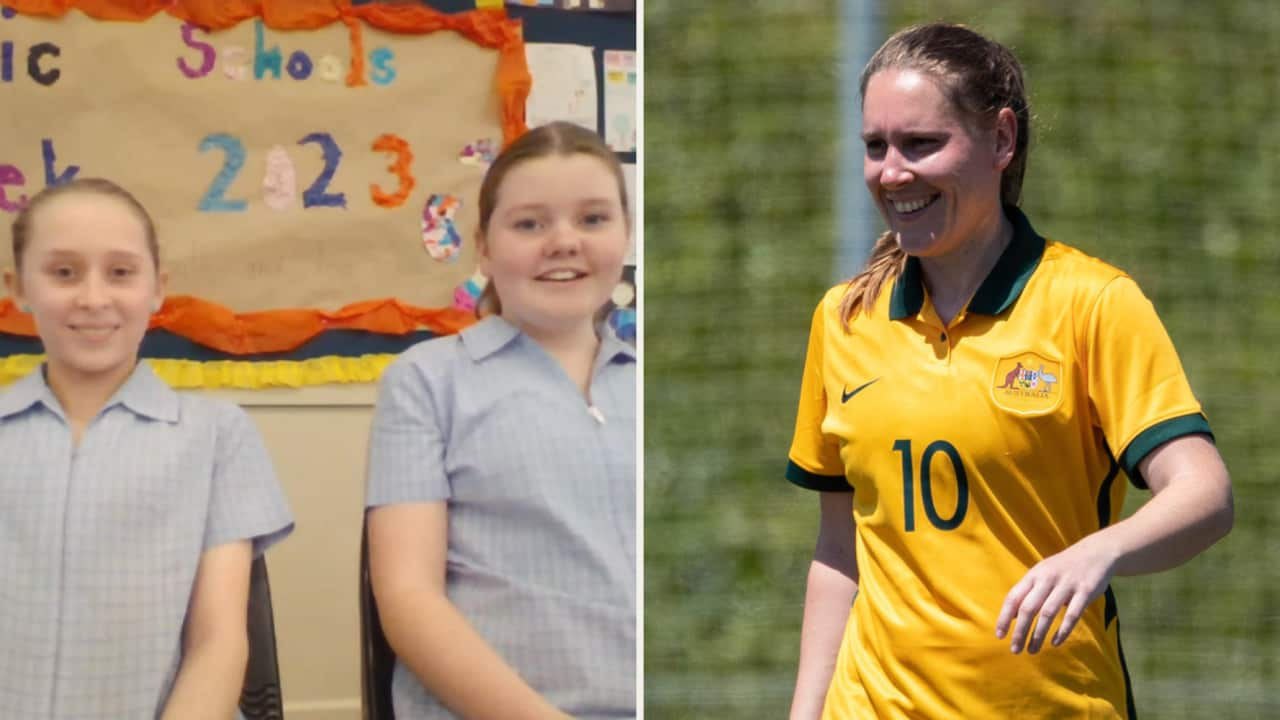

10 min read
This article is more than 1 year old
Feature
Australia has a world No.1 women's football team you might not have heard of
The Matildas' World Cup run gripped the nation in 2023. But Australia has another top women's football team that is just getting started.
Published 25 December 2023 5:40am
Updated 25 December 2023 1:42pm
By Emma Brancatisano
Source: SBS News
Image: Australia's ParaMatildas celebrate their win during the IFCPF Asia-Oceania Championships Women's Final match between Australia and Japan in Melbourne. (Getty / Con Chronis for Football Australia)
It was a "pinch me" moment for Carly Salmon.
In November, the ParaMatildas co-captain lifted the trophy with her teammates as they in Melbourne.
"It's a feeling that is really hard to describe," Salmon told SBS News.
"It was so exciting, but definitely only the start for us."
This was the first championship for players like Salmon, who have joined Australia's national football team for women and girls with cerebral palsy (CP), acquired brain injury and symptoms of stroke since its inception last year.
They're currently ranked No. 1 in the world.

The ParaMatildas celebrate their win during the IFCPF Asia-Oceania Championships Women's Final match in Melbourne. Source: Getty / Con Chronis for Football Australia
"But we're getting our names out there now. Hopefully, that means we can only grow, get more girls involved – and get Australia on board."
After the tournament, Salmon was "straight back to reality" as a primary school teacher – a career she "absolutely loves".
But it's also a necessity.
‘I thought the world was quite unfair'
Growing up in Wagga Wagga in regional NSW, Salmon was always active as a child.
She was diagnosed with cerebral palsy, a physical disability that affects movement and posture when she was 18 months old.
"I just wanted to try every single sport I could," she said.
"It wasn't until around [I was] 10 years old that I started to realise I was falling short in not keeping up with my peers and not being able to do the same things that people my age could."
Salmon recalls feeling "pretty devastated" by her disability.
"My body couldn't move in the way I wanted it to … I was definitely lacking a lot of self-confidence," she said.
"To be honest, I thought the world was quite unfair."

Carly Salmon, goalkeeper/midfielder of the ParaMatildas during a Pararoos and ParaMatildas squad announcement in Melbourne. Source: Getty / Kelly Defina Football Australia
She competed as a sprinter for about 15 years but admits the commitment had meant leaving behind the team sports she loved.
Football Australia launched the ParaMatildas program in March last year. The men's Pararoos program was first formed ahead of the Sydney 2000 Paralympics.
Salmon was among those watching the team's run to the first IFCPF World Cup final in Spain last May and says it "sparked something within [her]".
She joined a para football program in Canberra set up by head coach Kelly Stirton - and the rest was history.
Salmon said she has grown to love and embrace her disability.
"It has taught me so much – resilience, problem-solving. We're all unique, we all have limitations. We all have differences. And now I love having cerebral palsy. I embrace it."
'Football has always been my first love'
ParaMatildas co-captain Georgia Beikoff has been with the team from the start.
From Newcastle, NSW, she started playing football when she was six years old.
Beikoff was diagnosed with cerebral palsy from birth. Shortly after, she started having seizures and spent eight days in a neonatal unit. She said her parents were told she may not walk or talk.
"Mum and dad worked ridiculously hard for at least the first 12 years of my life," she said.
Beikoff, who scored a goal in the IFCPF final win, knew learning movement was important for her and took up "every sport under the sun".
At the age of 15, she also moved into para athletics "because there was no pathway in football".

Georgia Beikoff runs with the ball during the IFCPF Asia-Oceania Championships Women's Final match against Japan. Source: Getty / Con Chronis for Football Australia
"Football has always been my first love. Now that I'm older, I feel like there's a lot more freedom [in] playing football. I'm not needing to play to find my identity."
A ‘landmark moment that this sport exists'
Ayden Shaw is general manager for Disability Sport Australia, which works with member organisations to help people with disability to engage with sport.
He described the recent ICPFC tournament, and the ParaMatildas' success, as a "landmark moment" for para sport in Australia.
"Everyone always hears of the Paralympics. But now we're hearing so many great stories of other sports opportunities and different teams that have those pathways for people with disability," he said.
"I think it's a real celebration of everything that has happened in the last year."
After the , he said the ParaMatildas are continuing their legacy in their own right.
"I think for a lot of people, it's a landmark moment to know this sport exists, that there are opportunities out there – and we're actually really good at it."
A spokesperson for Football Australia said the ParaMatildas and Pararoos provide "opportunity and inspiration" for the growing number of people living with disability, while also breaking down barriers by "challenging societal perceptions of what people with disabilities can achieve".
"Their success on the pitch in international competitions can help us elevate their status as iconic national teams and foster a more inclusive perspective on disability."
‘We don't get paid anything to play'
When Beikoff isn't playing with the ParaMatildas, she's also back to her day job as a teacher.
For many of her students in western Sydney, "football is life".
"The school is right behind the 'ParaTillies', which is awesome," she said.
Salmon said the players still have to work to fund themselves.
"While inclusion in football has come a long way, and we're continuing to get more and more opportunities, unfortunately we don't get paid anything to play," she said.
Football Australia's spokesperson confirmed it funds both the ParaMatildas and Pararoos through sponsorship by businesses such as Commonwealth Bank along with public and corporate donations.
The teams are part of the 11 football programs that fall under the FA umbrella, including the Matildas and the Socceroos.
"Outside of the Subway Socceroos and the CommBank Matildas, all other national football teams do not receive match payments. However, all other costs associated with their involvement in the program are covered," they said.
They said prize money is not generally offered for most para, futsal and youth tournaments, which are about "presenting opportunity" over "making a profit". The governing body of CP Football, the IFCPP, has been contacted for comment.
The Pararoos were first formed through funding from the Australian Sports Commission (ASC) - the government agency responsible for supporting and investing in the sport. In 2015, the funding was withdrawn.
The Pararoos and ParaMatildas do not currently receive government funding.
"Funding for high-performance sport is aligned with Olympic, Paralympic or Commonwealth Games and allocated on a four-year cycle," an ASC spokesperson said.
They said the ASC also provides support through areas such as professional development, strength and conditioning and training facilities - which have been used by the ParaMatildas.
"Since government funding for all sports has decreased, sports have begun to embrace philanthropy as an additional funding option," the FA spokesperson said.
FA has partnered with the Australian Sports Foundation (ASF) to support both teams through fundraising.
"We've worked with them to help get our Pararoos and ParaMatilidas to be able to train, and then to be able to get to world championships – whether that's a World Cup or even to events here in Australia," said Ryan Holloway, ASF chief partnerships officer.
The foundation is a self-funded, not-for-profit Commonwealth entity and a deductible gift recipient, which means all donations are tax-deductible.
Elite athletes under financial pressure, research finds
According to research conducted by the ASF, published in August this year, an overwhelming number of Australian elite athletes are under significant financial pressure.
Almost half of the 2,304 surveyed athletes over the age of 18 were earning incomes from all sources of less than $23,000 per year. And, two in five of them aged 18 to 34 were suffering poor mental health as a result.
Holloway said costs for para-athletes can be substantially higher.
"It is hard for them to be able to maintain elite athlete status while still trying to live their lives as well," he said.
Shaw said it is common for para-athletes to compete in multiple sports "because you can't necessarily create a career in one particular sport".
He is looking forward to opportunities for para football to become "a career pathway option for these athletes, and not something they do on the side".
"I don't think the ParaMatildas are at the level of recognition that you do see with the Matildas, where we've just seen equal pay [with the Socceroos]," Shaw said.
While that is not necessarily the expectation, he said there could be "more investment into that area".
The Matildas have long pushed for more funding for their sport, and rounded out their recent World Cup run
In August, the federal government for women's sport, along with reforms to ensure free-to-air television access to women's sporting events.
And last month, a was announced that closes the pay gap between the Socceroos and the Matildas.
"I think it's wonderful knowing that in women's sport, equal pay is actually happening now," Beikoff said.
"But it is 2023, and we've waited a long time.
"I look forward to the day where we can take para football full time, because I think we have a lot to give as athletes on and off the pitch."
Salmon said para sports have been seen as a "novelty event on the side".
"Hopefully events like the Asia Cup have started to show people that we are worthy of attention, we are competitive - and we put in so much work," she said.
"I would love to see more financial support."
The FA spokesperson said more revenue generated through the support of its senior teams will mean more investment into the other national programs.
As the ParaMatildas prepare for the World Cup next year, their main goal is to trailblaze.
"We love the fact that we can now be a role model for young girls with cerebral palsy," Beikoff said.
Salmon agrees: "If we can make even just one little girl, or boy, with cerebral palsy think to themselves that having a disability is really cool, that they have a pathway, that would be absolutely amazing."




